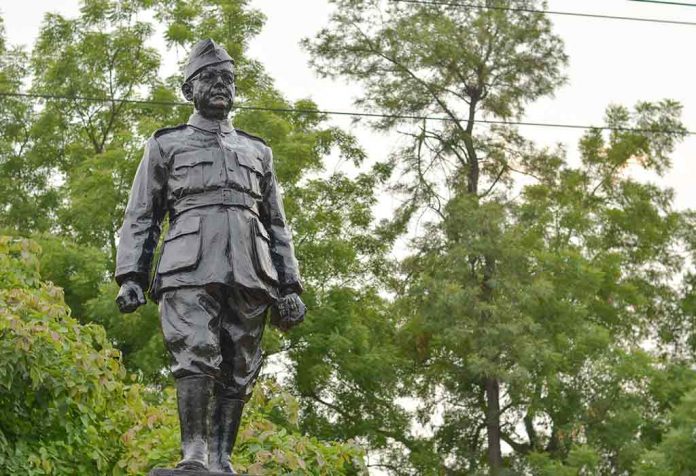India, the land of many colours, has sailed some rough waters until it gained freedom, thanks to the freedom fighters who envisioned the country as free and fought for our rights without caring for their lives. Among them was Subhash Chandra Bose, a great nationalist and prominent freedom fighter who actively participated in the Non-Cooperation Movement. His contributions are vast, so an essay on Subhash Chandra Bose is commonly assigned to kids. In this article, we talk about how to write short and long essays on the topic. Considering the significance of Bose as a freedom fighter, it is essential to get the facts and the narrative right. We will introduce important facts children need to remember about him and provide some tips on using them in an essay for classes 1, 2 and 3.
Key Points To Remember When Writing Essay On Subhash Chandra Bose
Remember these essential points when writing an essay about Subhash Chandra Bose:
Thank you for reading this post, don't forget to subscribe!
- Focus on facts about his life when writing one-line essays.
- Short essays can include snippets into his life and work as a freedom fighter. Don’t forget to add introductory and concluding lines to the essay.
- A long essay on Subhash Chandra Bose can delve into finer details about his life and work. Here, the introductory and concluding paragraphs can capture the image that characterises the person.
10 Lines On Subhash Chandra Bose
Writing 10 lines about Subhash Chandra Bose is a great place to start for children in the lower grades. Kids can memorise the facts and write them in short sentences in their 10-line essay. Here are a few lines about Subhash Chandra Bose:
- Subhash Chandra Bose is a famous freedom fighter and an Indian nationalist, known by everybody in the country.
- He was born in Cuttack, Odisha, in an affluent family. His father was Janakinath Bose, a successful lawyer, and his mother was Prabhavati Devi.
- Bose was the ninth child, and he had thirteen siblings.
- Subhash Chandra Bose was heavily influenced by the teachings of Swami Vivekananda, which contributed to his freedom-fighting efforts.
- Bose was and still is known for his political acumen and military knowledge.
- For his efforts during the Indian struggle for freedom, he was called ‘Netaji’ Subhash Chandra Bose, meaning ‘leader’.
- One of his quotes, ‘Give me blood, and I shall give you freedom’, became famous for reflecting the gravity of the freedom struggle.
- His Indian National Army was also called the Azad Hind Fauj.
- Subhash Chandra Bose was imprisoned for his participation in the Civil Disobedience Movement.
- Subhash Chandra Bose passed away in a plane crash in Taiwan in 1945.
A Paragraph On Subhash Chandra Bose
To write a small essay on Subhash Chandra Bose in English, focus on his significant contributions to the Indian independence movement. Here’s an example of an essay on Netaji Subhas Chandra Bose in one paragraph:
Netaji Subhash Chandra Bose was a famous leader in India’s fight for freedom. He was born on January 23, 1897, in Cuttack, Odisha. Bose studied hard and became a brilliant student. He wanted India to be free from British rule. He believed in fighting for freedom and said, “Give me blood, and I shall give you freedom.” Bose formed the Indian National Army to help in the struggle for independence. People loved and respected him, calling him “Netaji,” which means “Respected Leader.” Sadly, he died in a plane crash on August 18, 1945. His bravery inspires many even today.
Short Essay On Subhash Chandra Bose
In this small paragraph on Subhash Chandra Bose, we will talk about some of the things he did as a freedom fighter:
Born to a well-off family in Cuttack, Orissa, in 1897, Subhash Chandra Bose grew up being influenced by the Indian Freedom Movement. Eventually, he joined the struggle for freedom in the 1920s. Bose led a radical wing of the Indian National Congress (INC) that gained popularity after the 1930s. He eventually became the leader and the Congress president in 1938. After a difference of opinion with other leaders, he quit in 1939. When he was placed under house arrest by the British, he fled India in 1941 and made his way to Germany. There, he sought the sympathy of the Nazi party and their support in fighting the British. Aided by Japan, which was German’s ally, he headed the Indian National Army (INA) in an invasion against British occupation. The British forces thoroughly defeated the INA. He was eventually successful in establishing a Free India Radio, where he spoke to the people to motivate them to join the freedom struggle. His charm and charisma earned him followers who called him ‘Netaji’. Subhash Chandra Bose passed away in an aeroplane crash in 1945 in Taiwan. He is an idol for many and has inspired the country to fight for its freedom.
Long Essay On Subhash Chandra Bose
A long essay should balance facts with a good narrative characterising the person. Here’s an example of writing a long essay on Subhash Chandra Bose:
Subhash Chandra Bose, known as Netaji, is one of the most influential leaders in the Indian struggle for independence. His radical approach and unwavering commitment to freedom set him apart from his contemporaries. Bose’s famous declaration, “Give me blood, and I shall give you freedom,” encapsulates his dedication to India’s liberation. This narrative explores his early life, education, significant contributions to the freedom movement, and enduring legacy.
Birth And Childhood
Subhash Chandra Bose was born into an affluent family on 23 January 1897 in Cuttack, Orissa. His father, Janakinath Bose, was a prominent lawyer who instilled in him the values of education and social responsibility. Growing up in a politically charged environment, Bose was heavily influenced by the Indian freedom struggle and the teachings of Swami Vivekananda. As a brilliant student, he excelled in his matriculation examinations and developed a strong sense of nationalism from a young age. His early experiences with British discrimination fuelled his desire for independence and shaped his future endeavours.
Education
Bose completed his Bachelor’s degree in Philosophy from the University of Calcutta in 1918. In 1919, he moved to England to study higher and was selected for the Indian Civil Services (ICS). However, he became disillusioned with the British system and chose not to pursue a career with them. Instead, upon hearing about revolutionary activities back home, he returned to India in 1921. His political involvement began with the Non-Cooperation Movement, initiated by Mahatma Gandhi, which led to his arrest due to his active participation. Bose’s radical views often put him at odds with more moderate leaders within the Indian National Congress.
Contributions to the Freedom Movement
Bose founded the Indian National Army (INA), also known as the Azad Hind Army, as part of a radical wing of the freedom movement. His leadership inspired many Indians to join the fight against British rule. When he became president of the Congress Party, he collaborated closely with Jawaharlal Nehru, sharing a similar militant left-wing approach. Despite facing numerous challenges and setbacks, including the crushing defeat of the INA during World War II, Bose’s ability to galvanise support for India’s independence made him a national hero.
Death of Subhash Chandra Bose
Subhash Chandra Bose died under mysterious circumstances on 18 August 1945 when he was involved in a plane crash in Taiwan. The details surrounding his death have remained controversial and subject to speculation over the years. Nevertheless, his legacy as a fearless leader who fought for India’s freedom endures. He is remembered for his contributions to the independence movement and for inspiring generations with his vision of a free India.
Subhash Chandra Bose’s life was characterised by an unyielding spirit and profound commitment to India’s liberation. His radical ideology and leadership of the Indian National Army played crucial roles in mobilising support for independence from British rule. Today, Netaji is celebrated as one of India’s most significant national heroes, whose sacrifices continue to inspire countless individuals in their pursuit of justice and freedom. His legacy remains integral to India’s historical narrative and serves as a reminder of determination and courage in overcoming oppression.
What Will Your Child Learn From An Essay On Subhash Chandra Bose?
Writing a composition on freedom fighters teaches children about their involvement in India’s fight for freedom. Writing about Bose will enrich their knowledge about his life and the work he put in to secure India’s independence.
FAQs
1. Why Is Subhash Chandra Bose Called “Netaji”?
The title “Netaji” means “Respected Leader.” It was given to him by Indian soldiers in Germany during World War II because they admired his leadership and dedication to India’s freedom.
2. What Educational Institutions Did Subhas Chandra Bose Attend?
Subhas Chandra Bose attended several schools, including the Baptist Mission’s Protestant European School in Cuttack and later studied at Ravenshaw Collegiate School and Presidency College in Calcutta.
3. Did Subhas Chandra Bose Study Abroad?
Yes, Subhas Chandra Bose went to England to study and even passed an important exam to join the Indian Civil Service. However, he decided not to continue because he wanted to serve his country instead.
4. How Did Subhas Chandra Bose Escape From British Authorities?
Bose cleverly escaped from Kolkata by disguising himself as a Pathan (a person from the North-West Frontier of India) and travelled through different countries, including Germany and Japan, to gather support for India’s independence.
5. Where Is The Netaji Museum Dedicated To Subhas Chandra Bose Located?
The Netaji Museum, dedicated to Subhas Chandra Bose, is in his ancestral Kolkata home. It showcases his life and contributions to India’s freedom movement.
The information presented here is suitable for an essay on the topic for grades 1, 2, and 3. The article will give kids plenty of ideas and facts about Bose so they can write eloquent essays on the topic.
Also Read:
Essay on Mahatma Gandhi for Kids
Bhagat Singh Essay for Children
Essay on Freedom Fighter for Kids
Essay on Chandrashekhar Azad for Children











